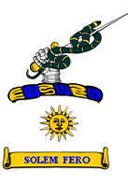|
SETTE COMUNI
The tableland of the
Sette Comuni in the province of Vicenza as
described by John Davies Mereweather in his
Semele; or the Spirit of Beauty: A Venetian Tale
(London, 1867), pages 146-152.
The author’s short
footnotes have been inserted into the text
within square brackets; two long footnotes are
placed at the end. Paragraph breaks have been
added. (The Cimbri are probably of Bavarian,
rather than Scandinavian, origin.)
The map, c. 1885,
shows the Sette Comuni, north of the city of
Vicenza. Distances by train: Venice-Padua 37 km,
Padua-Vicenza 30 km (Vicenza-Thiene 22 km, but
this line was opened after the publication of
Semele).
For more information,
see Marco Pezzo,
Dei cimbri
veronesi e vicentini, 3rd edition, Verona,
1763, 106 pp.; the second half of the book
consists of a vocabulary. See also Giuseppe
Aliprandi Asiago e l'Altipiano dei Sette
Comuni, 5th edition, Padua, 1942.
|
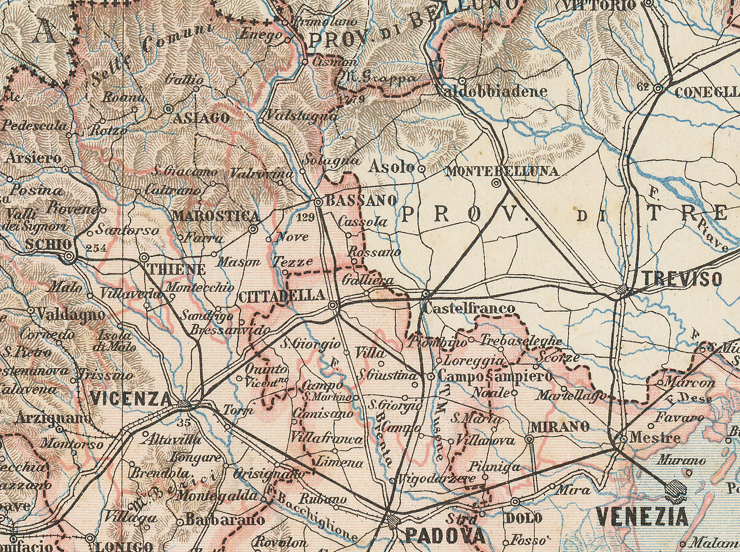
|
... Thence by way of Caltran she
ascended to the table-land of the
Sette Comuni, inhabited by descendants of a remnant of those
northern Cimbri or Jutlanders, whom Marius, about a hundred
years before our era, defeated on the banks of the Athesis or
Adige. After five hours of steep ascent, she arrived on a vast
undulating plateau of poor, badly watered land encircled by
hills partly clothed with pine forests. Proceeding onward, and
passing in her way curious porous rocks, she came to Asiago, the
small capital of this colony of 24,000 Scandinavians. And there
she stayed for two or three days visiting the other six Comuni —
Gallio, Roana, S. Giacomo di Lusiana, Enego, Foza, Rotzo.
Among these poor neglected people did the good English lady
go, entering their chimneyless dilapidated dwellings,
ministering to their many wants, and holding with them
conversation as well as she could in the pure German tongue. She
found them possessing all the physical characteristics of a
northern people; and they insisted that they were not Italians,
but Cimbri, evidently considering themselves a superior race.
They were very poor, they said, and had no rich amongst them;
the terrible winter went very hard with them; their sterile land
produced scarce any wheat [three of the Comuni grow a little
wheat] and no wine; and firewood was dear; but yet they were
strong and healthy; and during the long inclement winter
evenings they held reunions in their cow-houses, thus gathering
heat from the animals, which, together with sheep, were the only
staple production of their country.
They told her also that of old the Visconti, Scaligeri, and
later, the Venetian Republic, were kinder to them than the
present Government; that, besides other privileges, they were
allowed to sell their live stock in Vicenza market free of all
imposts; and not only that, but they enjoyed the Pensionatico,
or the right of quartering their sheep during the winter on the
farmers in the plains below; but that now all distinctive
privileges were cancelled.
Then Semele, accompanied by a group of flaxen-haired, ruddy,
plump children, went to see the great church which these pious
people were building; and in a school-house near she found a
priest catechising a circle of youthful catechumens from a
catechism compiled by a Bishop of Padua in the Cimbrian tongue,
which seemed to be a mixture of Scandinavian and old German. The
title-page of this curious book ran thus:— "Dar kloane
Catechismo vor de Síben Kaméün mit Halghen Gasang." When the
priest asked about the capital sins, how many they were, and
their names, he spoke thus:— "Bibel saint de sünte, da
rüfentsich Capitali?" and he received for answer, "Sibene:
Superbia, Scárcekot, Schántekot, Zornekot, Náidekot, Nait,
Naalecekot [Pride, Avarice, Luxury, Anger, Gluttony, Envy,
Sloth]."
When they were requested in these words to say the Lord's
Prayer, "Köt auf z'gapét von Gotte me Herren," they altogether
thus recited with uneuphonious effect — "Unzar Vater, vön me
Hümmele, sai gaéart eür halzar namo! kemme dar eür Hümmel; sai
gatáant allez baz ar belt iart, bia in Hümmel asň af d'earda;
ghetüz heüte ünzar proat von altághe; un lácetuz naach ünzare
schulle, bía bar lácense naach biar den da saint schulliküz;
háltetüz gahütet von tentaciún; un hévetüz de übel. Aso saiz."
When they were told to say the Ave Maria — "Kót auf de Ave
Maria" — they repeated in unison "Ich grüzach, Maria, volla
grázíen, Gott dar Herre ist mit eüch; séelik iart übar de
baibar; un séelik z'Kint von éürme laibe, Jesus. Halga Maria,
Muter von Gotte me Herren, pittet vor üz süntar, hemmest, un af
an stunt von ünzarme tóada. Asň saiz."*
And the priest told her that this was the second catechism
published in the Cimbrian tongue; that the first was compiled by
the order or recommendation of Cardinal Bellarmine [born in
1542], but that the language had become so changed since his
time, that a fresh translation became indispensable. The priest
then introduced her to an old man learned in Cimbrian
antiquities, cognizant of the past history of his race, and an
enthusiast regarding the beauties of his language; who lamented
the modernizing modifications which his beloved mother tongue
was gradually undergoing.
In the evening the sound of a full orchestral band playing
operatic music came across the incredulous ears of Semele. She
went out of the inn in the direction of the music, and in a
small open space quite near, she saw by the light of many
torches the good priest, her morning's acquaintance, standing in
the midst of forty or fifty young men, all provided with musical
instruments with music-stands before them, and conducting them
without the score through the intricacies of the overture of
Mozart's Flauto Magico. In the morning he told her that he had
wished to give her a glad surprise; he did not wish her to leave
with the impression that, because they were poor and of Teuton
origin, they were barbarians.
He told her that he was a Cimbrian himself, and was sent by
his poor parents to obtain his education, and ultimately his
ordination at Padua; that when he began his work as a clergyman,
he was grieved at the drunkenness which prevailed amongst the
Asiago people during the long, dreary and snowy winter evenings;
and that, having carefully studied the science of music himself,
he prevailed on the young men of the place to follow his
example, and choose each one his instrument. "For many years,"
he continued, "I worked very hard amid many difficulties to
carry out my scheme; but at last I have succeeded tolerably
well; and Handel, Mozart, and Rossini have been substituted in
Asiago for wine, cards, and quarrelsome language." **
Leaving Asiago, Semele reached Vicenza, the monumental city
of Palladio, surely the most beautiful city in Northern Italy,
after Venice, as she thought, and then returned to her beloved
City of the Waters, there to await the glad fulfilment of her
wishes.
----------
* I give a translation of this old Teutonic language into
modern German, so that the reader may institute a comparison.
Catechist. How many are the sins which are called
Capital? (Wie viel sind die Sünden die rufen sich [heissen]
Capitali [Hauptsünden]?)
Answer. Seven.: Pride, Avarice, Luxury, Anger, Gluttony,
Envy, Sloth. (Sieben: Hoffart, Geiz, Unkeuschheit, Zorn,
Völlerei, Neid, Faulheit.)
Catechist. Say the Lord's Prayer. (Saget auf das Gebet
von Gott dem Herrn.)
Answer. Vater unser, der Du bist im Himmel, geheiliget
werde dein Name; dein Reich komme; dein Wille geschehe, wie im
Himmel also auch auf Erden. Unser tägliches Brod gib uns heute.
Und vergib uns unsere Schulden, wie wir vergeben unsern
Schuldigern. Führe uns nicht in Versuchung; sondern erlöse uns
von dem Übel. Amen.
For the sake of those who are interested in the gradual
modification of languages, I give the Lord's Prayer in the
Teolistica-Alemanna tongue, a Teuton dialect of the ninth
century.
Fater unser, thu in himilon bist,
Giwihit si namo thin,
Quoeme richi thin,
Werdhe wille thin, sama so in himile endi in erthu.
Broot unseraz emezzigan gib uns hintu.
Endi farlaz unz schuldi unsero, samo sourr farlazzar scolom
unserem.
Endi ni giledi unsih in costunga.
Auz arlosi unsih fona ubile.
Catechist. Say the Ave Maria. (Saget auf das Ave Maria.)
Answer. Gegrüsset seiest du, Maria, du bist voll der
Gnaden; der Herr ist mit dir. Du bist gebenedeiet unter den
Weibern, und gebenedeiet ist die Frucht deines Leibes, Jesus.
Heilige Maria, Mutter Gottes, bitte für uns jetzt und in der
Stunde unseres Absterbens. Amen.
----------
** The state of these poor people is worthy of our deepest
commiseration, now that the peculiar privileges which they
enjoyed for so many years have been taken away. The whole
district embraces a large extent of table-land, elevated above
the adjacent Italian plains at least four thousand feet. What
the weather is in winter may be imagined from the fact, that on
the Easter day preceding the author's visit, the clergyman went
to church from his house through a lane of snow, the banks of
which were ten feet high. In such a climate scarce any wheat
will ripen; the growth of the vine is out of the question. Oats,
rye, barley, and potatoes, the last not very good, are all they
can make their sterile soil produce.
Such a state of things surely deserves exclusive privileges;
and exclusive privileges, such as I have already recounted, were
given to them, and continued under the Visconti, Scaligeri, and
the Venetian Republic. By Francis II of Austria these privileges
were confirmed on the 15th of February, 1798; but they were all
abolished by Sovereign Resolution in 1856. Consequently, the
200,000 sheep which they possessed in 1763, have dwindled down
to a comparatively small number; and there is no doubt that
these poor people are reduced to a state of great misery and
destitution. They have no resident gentry amongst them to
initiate useful enterprises, and teach them that their moral and
religious tendencies are very incomplete if accompanied by
obstinacy and stagnation, and a determination not to improve
upon their fathers.
It is to be hoped that the present Italian Government, which
proclaims itself the Regenerator of Italy, will vigorously take
in hand the sad case of the 24,000 poor Cimbri inhabiting the
bleak downs of the Sette Comuni.
|
|
Two small-size postcards from Asiago (Slege)
and Gallio (Gelle), postally used in August 1900, with
text in Italian and Cimbrian: |
Stazione climatica estiva ed invernale
Hoga ebene vun Slege tausong meter –
Altipiano di Asiago 1000 metri
|
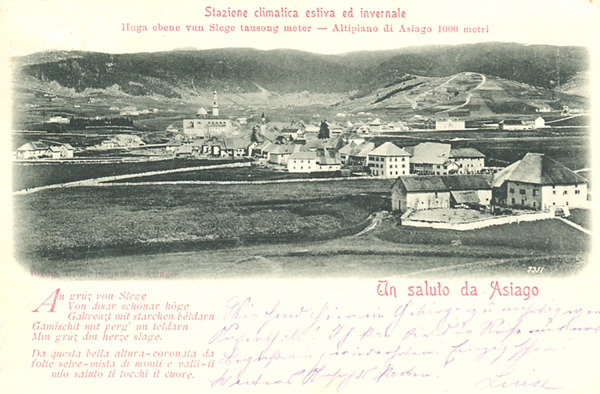 |
An grűz von Slege
Von disar schônar hôge
Gakrenzt mit starchen bęldarn
Gamischit mit perg’ un téldarn
Min grűz din herze slage. |
Un saluto da Asiago
Da questa bella altura – coronata
da
folte selve – mista di monti e valli – il
mio saluto ti tocchi il cuore. |
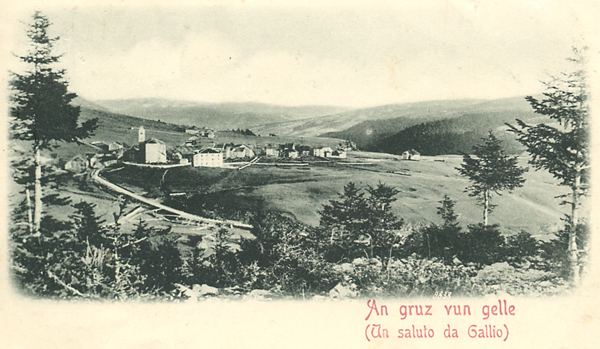
| |
An gruz vun gelle
(Un saluto da Gallio) |
Two small-size postcards from Roana and Foza, c.
1905:
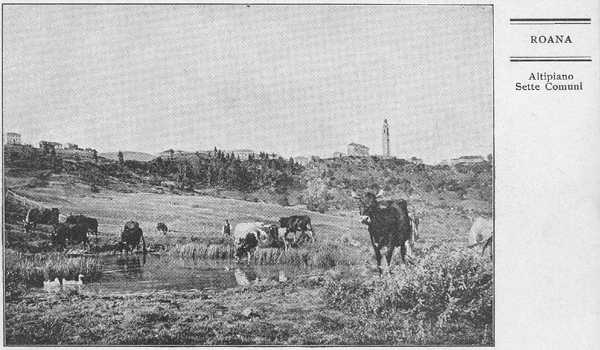
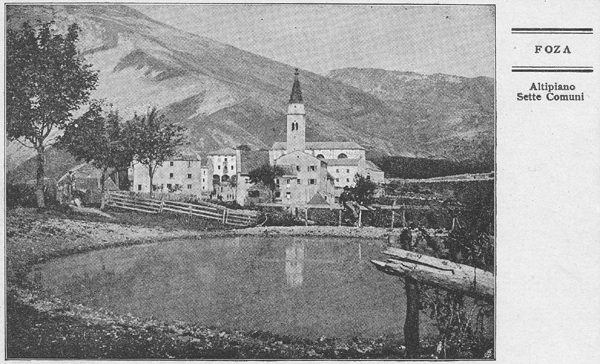
|
Three postcards from Enego, Lusiana and Rotzo, c.
1910:
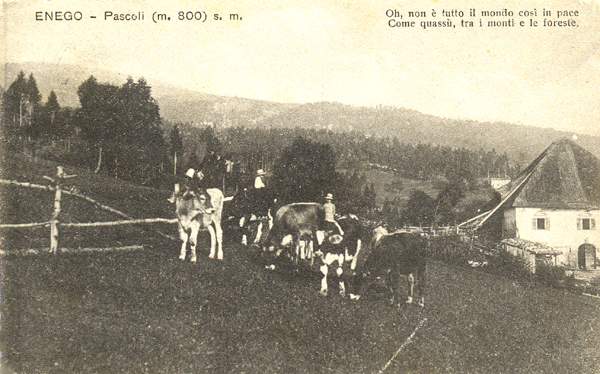
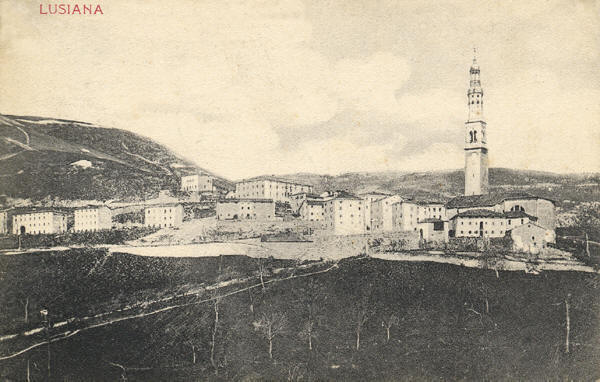
|
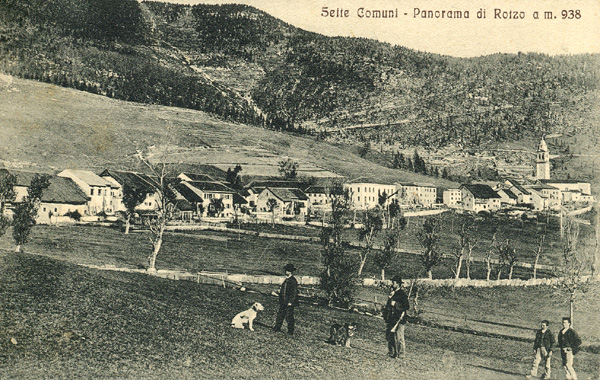
Brixen / Bressanone:
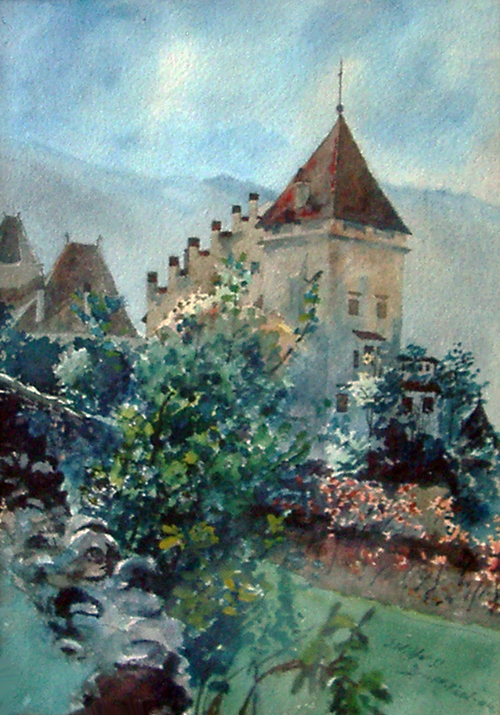
|
I take the
opportunity to show here a watercolour
dated "Brixen,
Tirol, 1904" by the Swedish
artist Gunnar Widforss. Brixen (Italian:
Bressanone) in South Tyrol is situated
some 150 km north of the Sette Comuni.
The painting shows the castle of
Hahnberg dating from the 16th century,
rebuilt around 1890; the castle is
situated to the north of the city
centre, across the river Eisack, in
Weinbergstrasse. |
|
